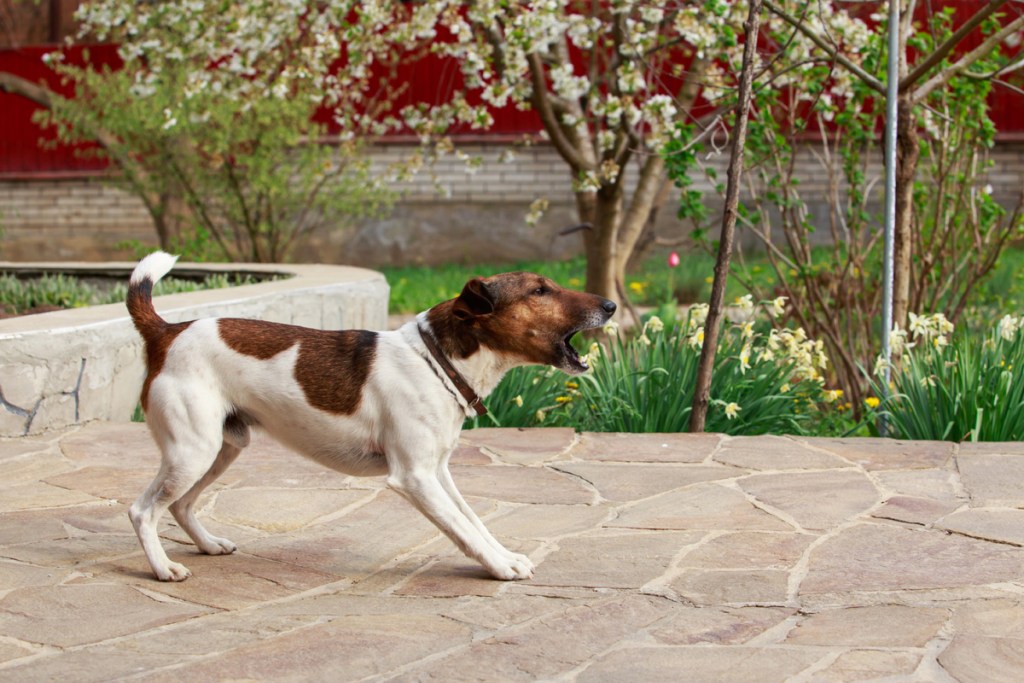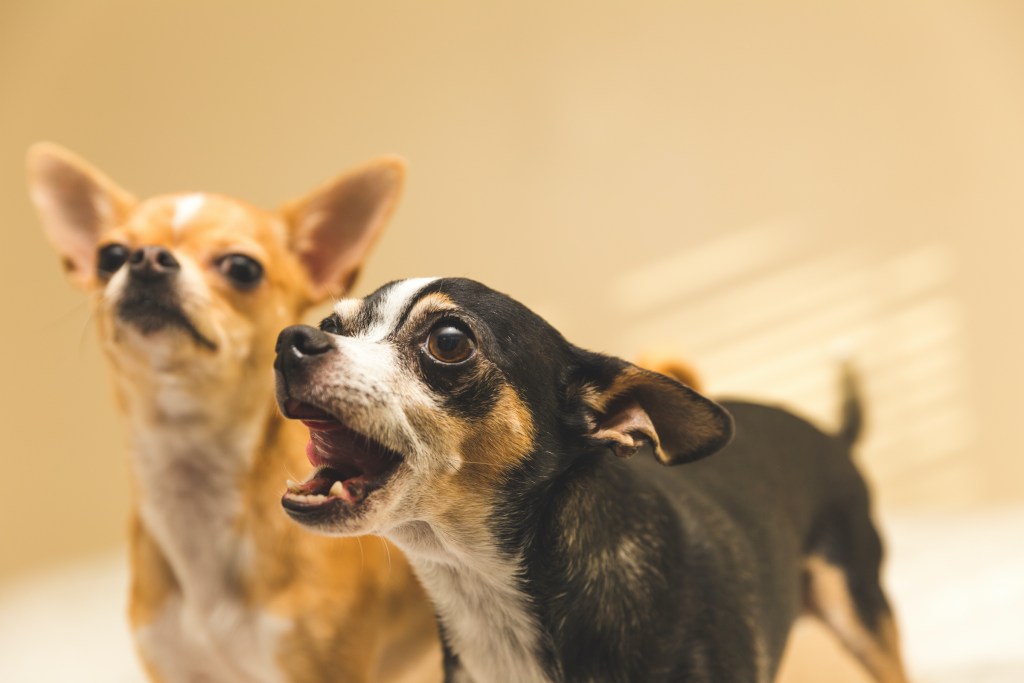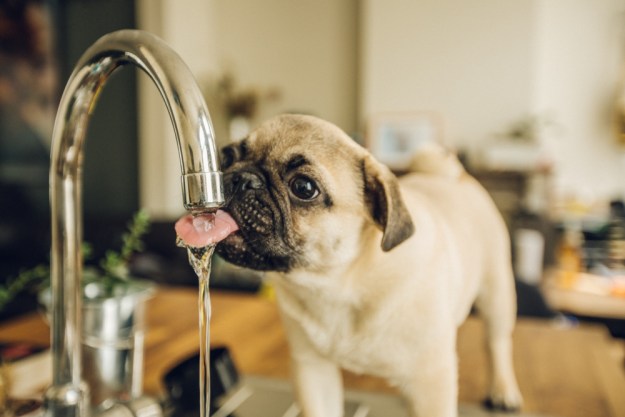
A dog that doesn’t bark often, or at all, seems like a dream come true to pet parents (and their neighbors). In reality, a quiet dog can be cause for concern, especially if a previously noisy pup suddenly becomes quiet. If you have a quiet pet, you might wonder, why won’t my dog bark?
Look no further. In this article, we’ll give you the reasons why your dog may have stopped barking and what to do if you are concerned. Remember, even if your dog’s lack of sound isn’t from a serious health issue, you can’t go wrong with asking your trusted veterinarian for advice.

When do puppies start barking? What does it sound like at first?
According to Certified Canine Behavior Consultant Mikkel Becker, puppies begin vocalizing around 2 or 3 weeks of age. At this early stage, you’re more likely to hear whines and grunts. When your puppy reaches 2 to 4 months, these vocalizations will start to turn into barks, though each dog reaches milestones at their own pace. If you’re worried about your pup’s vocal development, don’t hesitate to reach out to your veterinarian to rule out any potential issues.

Why doesn’t my dog bark? Is this behavior normal?
There are myriad reasons why your dog may not bark, from medical to emotional to even completely situational reasons. It may take some observation before you narrow it down, but with some diligence, you’ll be able to help your dog get comfortable with their own voice. These are a few reasons why your pup might be quieter than normal that aren’t a cause for great concern.
Breed disposition
While “a dog that doesn’t bark” rarely exists, some breeds are shyer than others when it comes to barking. Some quiet dog breeds include:
- Akita
- Australian shepherd
- Basenji
- Bulldog
- Greyhound
- Papillon
- St. Bernard
- Whippet
- And many more
Your dog’s personality or training
Sometimes, regardless of a dog’s breed, they just prefer not to bark often. This can develop when your dog is a pup or can happen as they age into adulthood and starts to lose some of their puppy energy. Even senior pups can have behavioral changes as they age, though a veterinarian should be sought out if it seems to happen overnight.
Dogs can also be trained not to bark, and this training can stick with them throughout life just like the command “sit.” If you’ve recently rescued a dog and don’t know their past, this could be a contributing factor to the silence. Unfortunately, shock collars and other invasive training can permanently deter barking, even after the reinforcement stops. A rescue dog may have previously gone through debarking, a painful surgical procedure that removes much of a dog’s laryngeal tissue. The shelter or rescue can provide more information if a dog had this procedure done.
Anxiety or new situations
Some dogs are a lot less vocal and apt to be 100% themselves when faced with a new situation. Big changes, like relocating to a new home, can be stressful for a pup, so be patient if they seem a little too quiet at first — they may just need some time to adjust. If the problem persists, especially if your furry friend is known for their voice, anxiety may be a factor.
Even without any big changes in their life, dogs can develop anxiety symptoms similar to ours, including being quieter than normal. Locating the source of your dog’s anxiety is key to helping them feel more comfortable and confident, and remember, your vet is always there to help if you’re unsure. Treatment may consist of medication, training, preventive strategies, or a combination of approaches.

When to consult a veterinarian
Although they are less common than behavioral concerns, there are more serious medical issues that can cause a dog not to bark. Here’s what to look out for:
Diseases of the larynx or respiratory system
A number of throat issues can occur, many of which affect a dog’s ability to bark. In these cases, your pup may try to bark but be unable to make a sound. Sometimes, a dog’s barks may sound quieter or you may hear a change to your dog’s tone of voice. These complications can have causes as straightforward as overuse of the voice or as complex as untreated cancer, which is why it’s smart to have your vet take a look.
Surgical complications
Trauma to the throat and larynx, including surgical intubation, can leave any canine feeling sore and hoarse. You may even notice a cough. Even successful procedures are hard on the body, so your pup may just need some time to recover. If the condition doesn’t improve, however, a follow-up may be necessary.
Chronic vomiting
Both people and pets experience throat discomfort from vomiting, especially when it becomes a frequent occurrence. The stomach acid that comes up with vomit can cause irritation or even ulcers in the throat, so this problem shouldn’t be left on its own. While you’re at the vet, you can also address the vomiting itself.
Whatever the reason for your dog’s lack of barking, you can easily help your furry friend with some diligence and care. Your veterinarian will also be there to guide you, so try not to panic. As scary as it may seem, a change in your dog’s barking habits can be healed before you know it.

How to get a stubborn dog to bark
Most pet parents ask the opposite. However, if you’re concerned and asking, “Why won’t my dog bark?” — you may hope to encourage your pet to be more vocal. You may be able to train a dog to bark — just like you can train one not to. Use positive reinforcement and consistent commands. “Speak” is a commonly used one when pet parents want their dogs to bark.
When your pet barks on command, treat them. Repeat this consistently, such as 5 minutes per day. That said, if your dog isn’t barking because of health issues, previous trauma, or it’s just simply not their thing, you may need to accept them for what they are. They love you unconditionally, so consider returning the favor.
Editors' Recommendations
- Why does my dog have a bald patch on their tail? Here are the answers you need
- Is your dog barking nonstop? Here’s how to get your noisy pup under control
- What is the best food for older dogs? These 6 vet-approved kibbles and canned foods won’t steer you wrong
- This is the ultimate week-by-week puppy training schedule every new pet parent needs
- Why is my puppy not eating? Find out why and how to help them thrive




